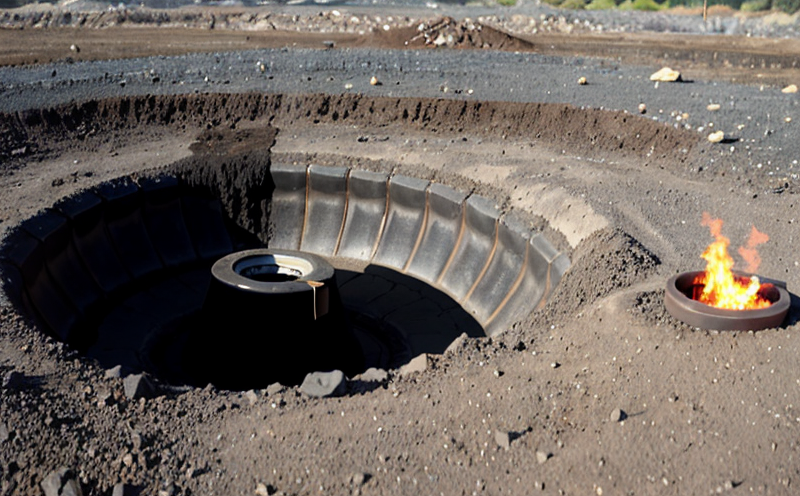BS 6201 Calorific Value of Coal Testing
The British Standard (BS) 6201 method is a widely recognized procedure used to determine the calorific value of coal. This test is crucial for quality control and compliance in various sectors including power generation, mining, and industrial processing. The calorific value, often expressed as GCV, represents the amount of heat released by burning a unit mass or volume of fuel under standard conditions. Understanding this metric is essential for optimizing boiler efficiency, predicting energy output, and ensuring regulatory compliance.
The BS 6201 test involves precise combustion in an oxygen-rich environment followed by calorimetric measurement of the resulting heat release. It requires careful preparation of coal samples which must be homogenized to ensure uniformity. The coal is then ignited under controlled conditions within a bomb calorimeter, where the released heat energy is captured and measured.
The standard specifies detailed procedures for sample preparation, apparatus calibration, and safety measures during testing. For instance, the coal should have a moisture content not exceeding 10% to reduce measurement errors. The use of appropriate drying methods and desiccants ensures accurate results. Calibration of the calorimeter is critical; it involves determining the heat capacity of the calorimeter itself using known reference materials such as benzoic acid.
In practice, this test can be complex, requiring stringent adherence to protocols to ensure reliable results. Variations in sample preparation or calibration can lead to significant discrepancies. Therefore, laboratories specializing in coal testing must maintain a high level of expertise and precision equipment. The process is not only about the technical execution but also involves meticulous attention to detail.
The application of BS 6201 extends beyond mere compliance; it provides actionable insights for operational improvements. For instance, by accurately measuring calorific value, power plants can adjust coal feed rates to maximize boiler efficiency and minimize waste. This not only enhances productivity but also contributes to cost savings. Similarly, in mining operations, understanding the calorific content of different types of coal aids in selecting the most suitable fuel source for various applications.
The standard is internationally recognized, aligning with global best practices in coal quality assessment. Compliance ensures that products meet international standards and are accepted across borders. This is particularly important for industries dealing with international trade where consistency and reliability are paramount.
Benefits
- Accurate measurement of calorific value enabling precise fuel management
- Enhanced boiler efficiency leading to reduced operational costs
- Improved decision-making for energy production processes
- Ensures compliance with international standards and regulatory requirements
- Promotes consistency in product quality across different batches
- Supports sustainable practices by optimizing resource utilization
The BS 6201 calorific value test is a cornerstone for industries reliant on coal as a fuel source. It provides critical data that can drive operational improvements and cost savings, making it an indispensable tool in quality management.
Customer Impact and Satisfaction
For customers involved in power generation or industrial processing, the accuracy of calorific value measurements is paramount. Reliable test results enhance trust within the supply chain, ensuring that all parties are working with consistent and high-quality coal products. This not only improves operational efficiency but also enhances customer satisfaction by delivering predictable fuel performance.
By adhering to BS 6201 standards, laboratories can ensure that their clients receive accurate and verifiable results. This builds long-term relationships based on reliability and trust. Moreover, compliance with international standards is a key differentiator in the global market, helping companies stand out as leaders in quality assurance.
Customers benefit from reduced operational risks due to the precision of calorific value measurements. This reduces the likelihood of unforeseen issues such as fuel inefficiencies or non-compliance penalties. In turn, this leads to enhanced customer satisfaction and loyalty.
Environmental and Sustainability Contributions
- Promotes efficient use of coal resources through accurate calorific value testing
- Reduces waste by optimizing fuel consumption based on test results
- Supports sustainable practices in energy production by enhancing efficiency
- Aids in reducing carbon emissions through optimized fuel usage
The BS 6201 calorific value test is not just about meeting regulatory requirements; it plays a crucial role in promoting sustainability. By ensuring that the most efficient coal types are used, industries can reduce their environmental footprint and contribute positively to global sustainability goals.
Through accurate testing, power plants can minimize unnecessary fuel consumption, thereby reducing carbon emissions and other pollutants associated with inefficient burning processes. This contributes to cleaner air and a more sustainable future for all stakeholders involved.





